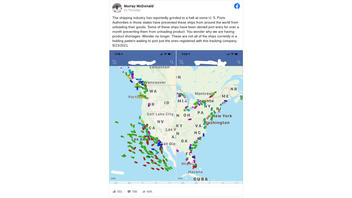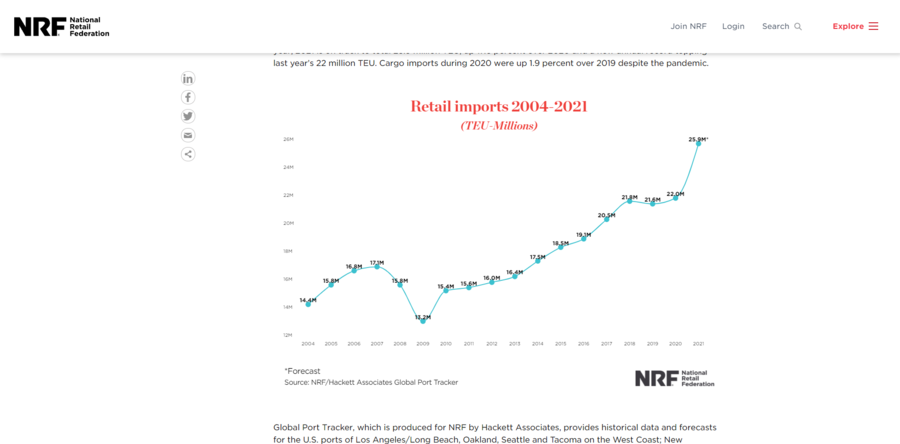
Are cargo ships being prevented by U.S. states from unloading goods, causing a backlog? No, that's not true: Although there are dozens of waiting ships at U.S. ports that is resulting in a delivery backlog, the backlog is the result of supply chain problems, changes in consumer demand and port worker availability, not by states preventing ships from unloading their goods.
The claim appeared in a Facebook post (archived here) published on September 23, 2021. The post featured screenshots of a live map of coastal ports and ships with a caption that read:
The shipping industry has reportedly grinded to a halt at some U. S. Ports Authorities in those states have prevented these ships from around the world from unloading their goods. Some of these ships have been denied port entry for over a month preventing them from unloading product. You wonder why we are having product shortages. Wonder no longer. These are not all of the ships currently in a holding pattern waiting to port just the ones registered with this tracking company. 9/23/2021
This is what the post looked like on Facebook on September 28, 2021:
(Source: Facebook screenshot taken on Tue Sep 28 13:52:39 2021 UTC)
In a phone call with Lead Stories on September 27, 2021, James Kipling Louttit, executive director of the Marine Exchange of Southern California, addressed the Facebook post's assertion that ships were "prevented" by states to unload:
I don't think the word 'prevent' is accurate.
Louttit explained that the term "prevent" would usually only be applied to situations that required the halt of ships for cautionary reasons, such as a tsunami warning, an incoming hurricane or even a ship crew with high numbers of positive COVID-19 results.
The backlog of cargo ships has been attributed to a record volume of cargo entering U.S. ports. In an email to Lead Stories on September 28, 2021, Jan Hoffmann, head of the trade logistics branch in the division on technology and logistics for the United Nations Conference on Trade and Development (UNCTAD), said:
There are many complex reasons that lead to congestion and delays, but there is no action by port authorities that prevents these ships from unloading.
Hoffmann directed us to UNCTAD's April 2021 policy brief about container shipping for more information. One of the key points of the brief stated:
At the start of the COVID-19 pandemic, expectations were that seaborne trade, including containerized trade, would experience a strong downturn. However, changes in consumption and shopping patterns triggered by the pandemic, including a surge in electronic commerce, as well as lockdown measures, have in fact led to increased import demand for manufactured consumer goods, a large part of which is moved in shipping containers.
As at the third quarter of 2020, lessening of lockdown measures and varying speeds of recovery worldwide, as well as stimulus packages supporting consumer demand, inventory-building and frontloading in anticipation of new waves of the pandemic, contributed to leading to a further increase in containerized trade flows.
Although the National Retail Federation (NRF) reported that retail growth is high but has slowed due to COVID-19 disruptions, it also predicted that retail imports will number 25.9 million 20-foot equivalent units (TEU) -- which is a 20-foot container or a unit of that size -- in 2021, which is significantly higher than the retail imports in 2020. A screenshot of retail import numbers and estimates from 2004 to 2021 is included below:
(Source: NRF screenshot taken on Tue Sep 28 14:15:19 2021 UTC)
In an email to Lead Stories on September 28, 2021, Danielle Inman, senior director of media relations for NRF, said:
Throughout the pandemic, supply chain issues have been front and center for retailers. The supply chain has been stretched from end to end. Demand has outpaced supply of products as well as the equipment and people needed to move these goods. This stress on the supply chain has resulted in added transportation costs and delays for many retailers.
NRF submitted a letter to President Biden earlier this summer outlining the current supply chain challenges that continue to impact prolonged economic recovery, including congestion at the ports.
The images included in the Facebook post making the claim appear to be screenshots from a live map on MarineTraffic, a global ship tracker, but do not prove that states were preventing cargo ships from entering ports and unloading their goods.
This is not the first time there has been a backlog of cargo ships at U.S. ports for the same reasons. Earlier in 2021 and in 2020, the combination of COVID-19 disruptions and increased retail demand overwhelmed the supply chain, leading to container ship traffic jams at ports where cargo is shifted to trucks.
Lead Stories reached out to the Federal Maritime Commission and the International Trade Administration about the claim and will update this story with any response.



















